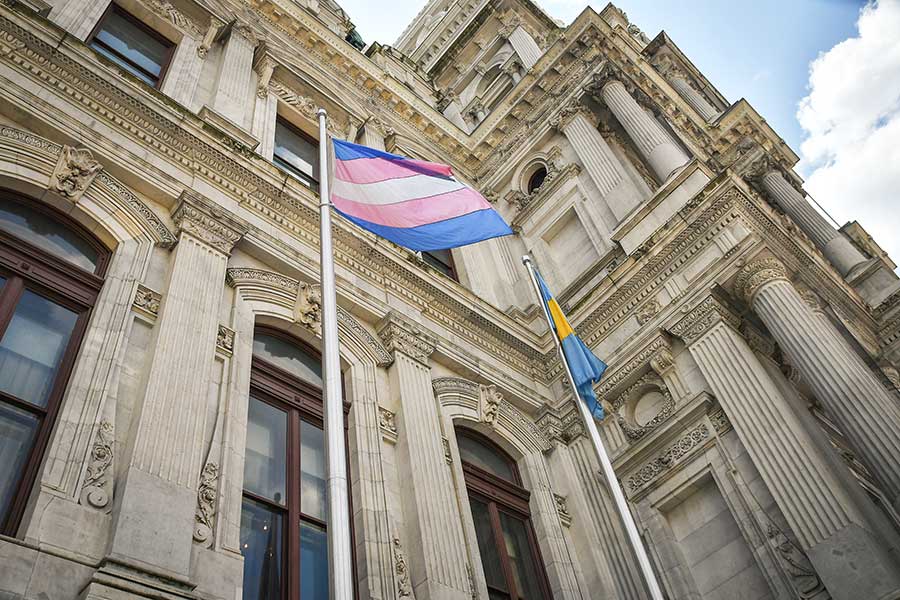Three transgender women continue to pursue their legal challenge of a provision in the state’s name-change law that prevents Pennsylvanians convicted of serious felonies from changing their names.
The litigants are Philadelphia resident Alonda Talley and Allegheny County residents Chauntey Mo’Nique Porter and Priscylla Renee Von Noaker. They’re represented pro bono by the Reed Smith law firm, based in Pittsburgh, and the Transgender Legal Defense and Education Fund, based in New York.
In May, they filed their legal challenge of the name-change ban in Commonwealth Court. Earlier this month, in a 49-page brief, they reiterated their challenge of the ban. Their brief takes issue with a brief filed Sept. 16 by state Attorney General Josh Shapiro, asking the court to dismiss the women’s case as meritless.
Shapiro’s brief claims the state legislature acted properly in 1998 when it unanimously enacted the name-change ban for persons convicted of serious felonies. Those felonies include murder, voluntary manslaughter, rape, involuntary deviate sexual intercourse, sexual assault, aggravated indecent assault, robbery, aggravated assault, arson and kidnapping.
In his brief, Shapiro noted that Porter was convicted of aggravated assault in 2008, Talley was convicted of aggravated assault in 2009 and Von Noaker was convicted of rape in 1987. Shapiro’s brief states that it’s proper for the women to be held accountable for their actions. His brief also emphasizes that the name-change ban doesn’t discriminate on the basis of gender identity.
“The purpose of the statute is to promote the important — indeed, paramount — interest of public safety by preventing people convicted of serious felonies from changing their names in order to avoid detection and escape the consequences of their convictions,” Shapiro’s brief states. “The restrictions apply equally to all Pennsylvania residents convicted of the enumerated offenses regardless of their race, religion, gender, gender expression or identity.”
According to the women’s Oct. 16 brief, the right to change one’s name was codified into law in Pennsylvania is 1852. Forcing someone to express an undesired name violates their free-speech rights, the brief asserts.
“When Pennsylvanians are denied a right to change their names, they are forced to express a name that is not theirs,” the brief states. “They cannot refrain from speaking nor from otherwise expressing a false, personal identity.”
However, Shapiro’s brief claims it’s the government’s speech at issue, not the women’s. His brief asserts that the government is accurately speaking when requiring the birth names of the women to appear on government-issued identification.
The women’s brief emphasizes the necessity of having the name-change ban declared unconstitutional. “It is the duty of the courts to declare legislation unconstitutional when it abridges a right, like the one here, that is inherent in our common law and protects fundamental interests,” the brief states.
Additionally, the women’s brief notes that if the ban is lifted, the women would still be required to attend a hearing and demonstrate to a judge that they’re acting in good faith. The women aren’t challenging that provision.
Shapiro’s brief questions the effectiveness of such a hearing in screening out fraud, since a prosecutor won’t be involved. “Would those seeking a name change bear the burden of proving that their motives are proper, or would the court bear the burden of showing that the petitioners’ motives in seeking a name change were improper?” Shapiro’s brief asks.
But the women’s brief maintains that the hearing would provide ample opportunity for a judge to ascertain the motives of a petitioner.
“The trial court that considers the [name-change] petition will be well aware that the petitioner previously has been convicted of a felony and capable of determining if the petitioner is seeking a name change for a fraudulent or otherwise harmful purpose,” the women’s brief states.
As of presstime, the court hadn’t ruled on the state’s request to toss out the women’s lawsuit.
M. Patrick Yingling, an attorney for the women, expressed confidence about their case.
“We believe that we have a very valid legal argument,” Yingling told PGN. “We’re confident in our position that every Pennsylvania resident deserves an opportunity to go before a judge and request that their name be changed.”
Shapiro ‘s office issued this statement: “Under Pennsylvania state law, people convicted of the most serious felonies are permanently prohibited from changing their names — straight, gay, lesbian, or transgender. This law was put in place by the Legislature in 1998 and any policy modifications would be the responsibility of state lawmakers. It is the duty of our office to defend Pennsylvania statutes under the Commonwealth Attorneys Act.”

